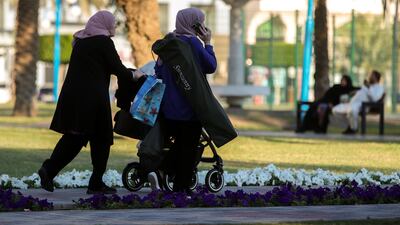Traditional social systems established in the mid-20th century lack the capacity to address the challenges of the modern world. This much has become evident in recent decades. Demographic, technological and economic shifts have raised the question of whether current systems are equipped to support people in the future.
According to the UN, the world’s population is projected to peak at approximately 10.3 billion in the mid-2080s, before gradually declining to around 10.2 billion by 2100.
Following this trajectory, the population of adults aged 65 and older will overtake that of children under the age of 18 by 2070, while by the mid-2030s, the population of adults over 80 will surpass that of newborns.
This widening gap, driven by both accelerating ageing and declining birth rates, represents a global challenge that cannot be solved by one country alone.
These circumstances are exacerbated by what the World Health Organisation calls a “silent crisis” in mental health. Today, more than a billion people worldwide live with mental disorders such as depression or anxiety, making it one of the leading causes of long-term disability. However, countries only devote around 2 per cent of their healthcare budgets to mental health services, and there are only 13 licensed mental health professionals for every 100,000 people.
The majority of nations continue to rely mostly on conventional psychiatric hospitals, with less than 10 per cent offering effective community-based care models. These realities underscore that social care can no longer remain a conventional concept limited to financial support or basic services but must evolve into an integrated system that prioritises human well-being – physical, mental and social.
To better evaluate future readiness in social care, we must examine three key pillars: people, practice and policy.
People are no longer just passive recipients of care, but rather participate in shaping it. The increasing prevalence of volunteering and community engagement around the world indicates that people are willing to contribute socially if provided with the right channels.
According to estimates, approximately 51 per cent of the population in Nigeria, 46 per cent in Indonesia, and 40 per cent in Kenya engage in volunteer work, compared to less than 10 per cent in some other countries.
In Abu Dhabi, volunteer hours have risen significantly in recent years, surpassing 1.7 million hours in 2024, a 95 per cent increase over the previous year.
These figures indicate the public's willingness to contribute to the solution. The important thing here is not the statistics themselves, but rather how people are enabled to transform their passion into real change.
When it comes to practice, it remains one of the biggest challenges facing the global social care sector. According to WHO estimates, there is currently a shortage of millions of qualified professionals in care fields, particularly as demand for care rises due to the growing number of elderly people worldwide.
By 2030, the number of people in need of care is projected to reach 2.3 billion, which implies that the quality of care may decline without clear professional pathways, licensing and training standards.
Across thriving global environments, social care is seen as an approved profession governed by ethical and organisational standards, instead of something that is voluntary. That is why we have begun licensing social workers and psychologists in Abu Dhabi through an integrated digital system. We are confident that this system provides a practical foundation for the region to build upon.
In the context of social policy development, we must shape a framework that blends ambition with reality. In addition to addressing present issues, sustainable social policies also prepare for future challenges.
For instance, changes in work patterns driven by artificial intelligence will create new opportunities, while also deepening the gap for vulnerable groups. Smart policies must involve measures that ensure technological transformation does not widen social inequality but rather becomes a tool for human empowerment.
This is why a redefinition of social care as an investment in human and social capital is required. Societies that manage to empower people, regulate practice and shape flexible policies will be more capable of withstanding crises. They will attract greater talent and remain resilient over the long term.
Social culture that acknowledges human care as a shared responsibility – whether for children or the elderly, employees or retirees, those in good health or those battling illness – is what drives change as opposed to just laws or initiatives. As a result, the future needs to be built around a comprehensive vision that identifies social care as the foundation of sustainable development.
Social care is not simply a supplementary service but an investment in the future of humans, the sustainability of communities, and their civilisational stability. In Abu Dhabi, we assess these issues from a regional viewpoint with the goal of contributing to the global dialogue.
To get there, we recognise that it is vital to start with the ultimate goal: to prepare for a future where people are at the centre of policy, practice becomes the standard of quality and policy becomes a tool for sustainability. Directing efforts towards this vision is what will determine the nature of societies in the second half of this century.


